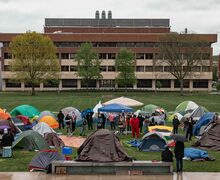Employment outlook appears more promising for Class of 2013
The job outlook for graduating seniors in the Class of 2013 appears to be better than last year, though just by a little bit.
“Employers we work with tend to be more optimistic about the hiring this year,” said Mike Cahill, director of Syracuse University Career Services.
A survey released by the National Association of Colleges and Employers, a nonprofit organization that assesses the employment outlook for college graduates, said companies participating in the study expect to hire about 2.1 percent more college graduates from the Class of 2013. The survey was done from Feb. 11 to March 27 and is based on the responses of 196 employers such as Macy’s Inc., Coca-Cola Co. and Northrop Grumman Corp.
In fall 2012, NACE released a survey saying companies planned to hire 13 percent more college graduates. The fall and spring projections aren’t a perfect comparison because the surveys don’t have the same respondents, said Andrea Koncz, employment information manager for NACE.
This decrease is consistent with job reports that show growth is less than anticipated, but employers still say they plan to increase hiring, according to the survey.
“We’re still saying it’s a positive outlook,” Koncz said.
Businesses need reasons to hire, such as increased sales or orders, said Don Dutkowsky, a professor of economics in the Maxwell School of Citizenship and Public Affairs at SU.
There’s evidence that businesses are expanding moderately, he said, but they often do this by increasing existing workers’ hours.
“The economy still hasn’t fully recovered since the great recession,” he said.
In April, the unemployment rate in the United States was 7.5 percent, down 0.4 percent from January, according to the Bureau of Labor Statistics. Dutkowsky said the unemployment rate hovers at about 5.5 percent in a fully recovered economy.
Yet Dutkowsky said college graduates still have an advantage in the workplace compared to people who only have a high school diploma. On average, college graduates make almost double the amount of money and have a substantially lower unemployment rate.
Graduates should enter the job market as soon as possible, Dutkowsky stressed, even if a job seems “below them.” This way, graduates are able to show companies they have the skill set to succeed, and can get a better idea of what they want to pursue for a career, he said.
Not all projections for the Class of 2013 are positive. According to an April 10 brief from the Economic Policy Institute, a nonprofit and nonpartisan think tank, “the prospects for young high school and college graduates remain dim.”
One section of the brief focused on college graduates ages 21-24 who don’t have an advanced degree and aren’t enrolled in further schooling. The 2013 unemployment rate for this group sits at about 8.8 percent. The underemployment rate — or part-time workers who want full-time work — is about 18.3 percent, according to the brief.
The institute states in the brief that the outcomes for the Class of 2013 aren’t known yet, and that the economy is slowly improving.
Cahill, director of SU Career Services, said using resources such as SU alumni to research certain fields and build connections could boost graduates’ chances.
This proactive search, as opposed to simply responding to job postings, helps graduates find jobs, even in a weak market, he said.
“You really have to go out and make connections with people,” he said. “If you think you might want to work in a retail sales environment, you try to connect with people actually doing that.”
An individual graduate can increase the chance of getting a job by being persistent and preparing for a more extensive search than he or she would like it to be, he said.
Said Cahill: “It’s not a pessimistic world out there for the college grad.”
Published on May 9, 2013 at 12:01 am
Contact Dylan: [email protected] | @dylan_segelbaum




